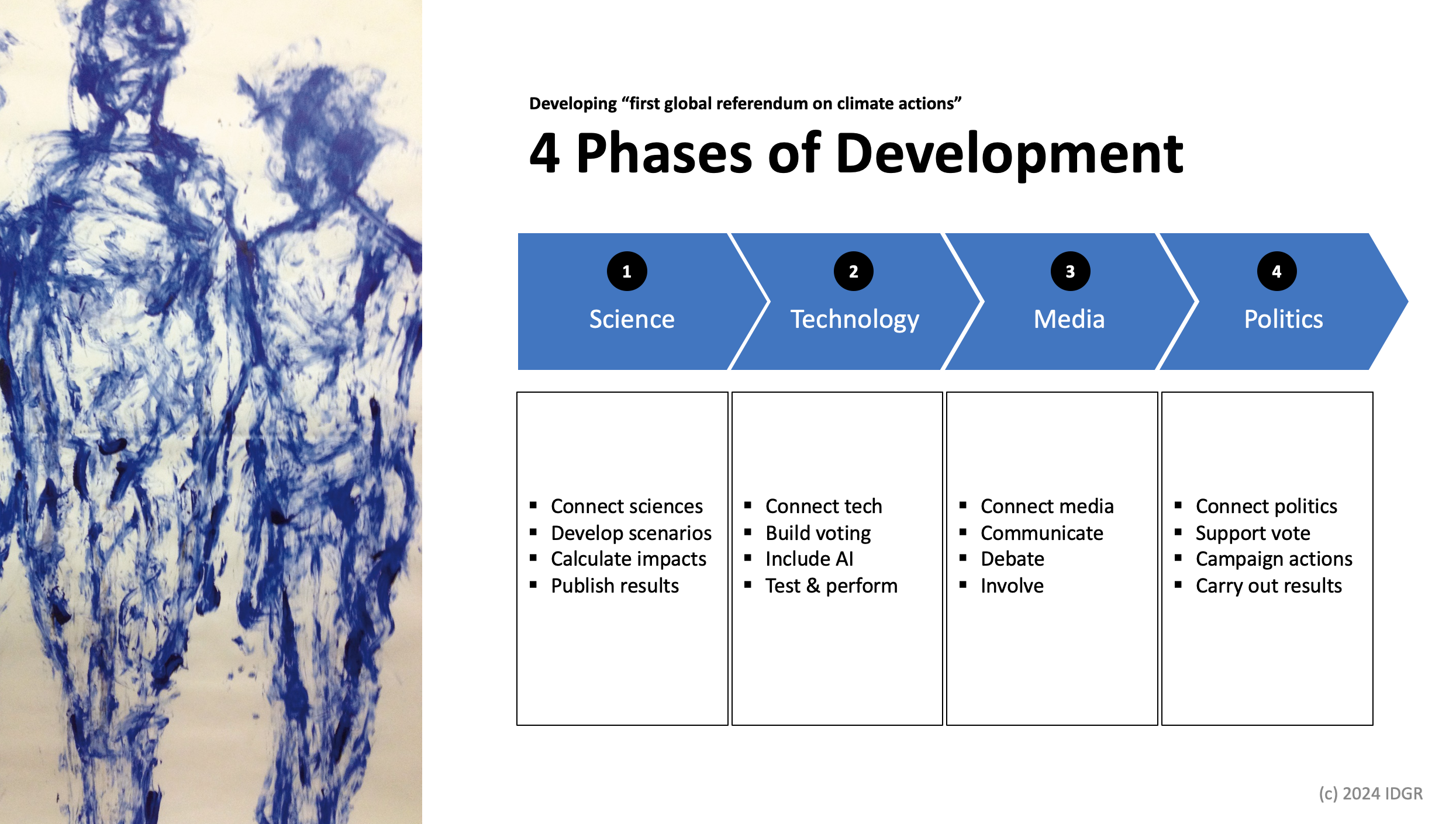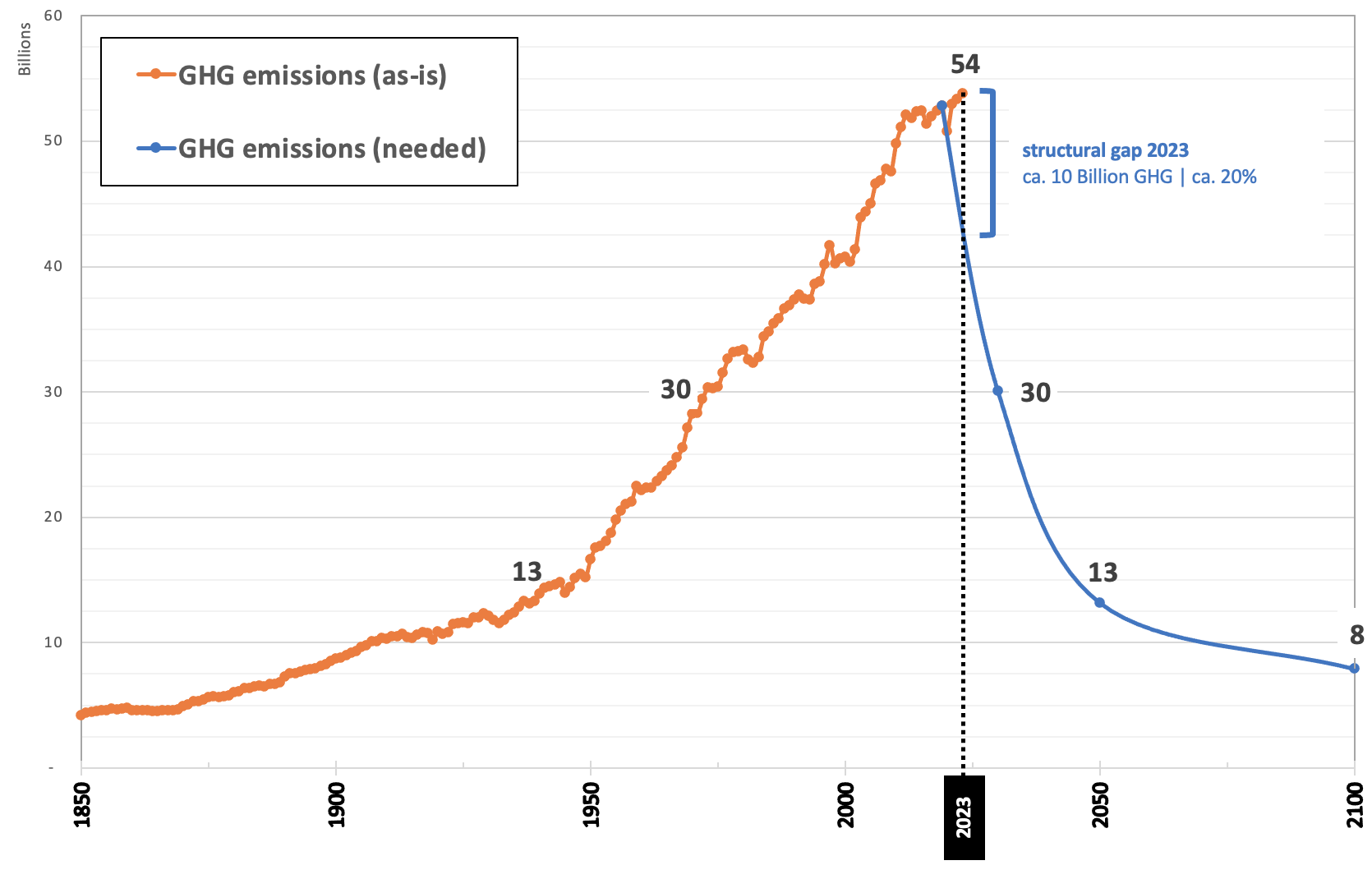After (1) the “UN Biodiversity Conference” (CBD COP16) and the corresponding “decisions” from November 1, 2024, (2) the “G20 Brasil 2024” summit and the corresponding “Rio de Janeiro Declaration” from November 19, 2024, and (3) the “UN Climate Change Conference Baku” (COP29) and the corresponding “Baku Climate Unity Pact” from November 24, 2024, we are confident, that we need a significant structural global change to actually reach the needed, very fast reductions of annual global “Greenhouse Gas” (GHG) emissions to keep global warming, climate change, and the loss of biodiversity “under our control” (see “trans- & interdisciplinary global warming scenario“).
Based on the global “Greenhous Gas” (GHG) emissions and the needed reduction of ca. 40% till 2030 with reference to the “Intergovernmental Panel on Climate Change” (IPCC), we are already ca. 10 Billion (ca. 20%) GHG emissions annually off track (see graph and “structural gap 2023”). Furthermore, global annual GHG emissions are still increasing, so the “structural gap” will significantly increase within the upcoming years. Thus we come to the conclusion, we are off track to actually keep global warming, climate change, and the loss of biodiversity “under our control” and to prevent the most likely greatest humanitarian catastrophe in human history.
Confronted with this situation, we see a very strong demand for a first global direct democratic vote (referendum) on climate actions. 5,4 billion people, 67% of the world’s population were using the internet in 2023 (see itu.int). So we think, such a “first global democratic referendum on climate actions” can be organised with relative ease within months (depending on the available budget, etc.) via the World Wide Web and smartphones.
Based on a first rough estimation, the “project” of a “first global democratic referendum on climate actions” demands about 50 – 200 Million USD and should be possible to be carried out within 1-3 years. Butting this in relation to approximately 1 Trillion USD direct costs per year from global warming loss and damages, the “Return on Investment” (ROI) of such a “first global democratic referendum on climate actions” would be outrageous.
Strong leadership means to enable (grass-roots) democracy. A global vote will be aligned with the “Universal Declaration of Human Rights”, give a clear and strong direction on climate actions and will strengthen global and national democracy.

To actually carry out such a global vote on climate actions, we see the following 4 phases necessary in advance (see graph):
(1) Science explains the consequences
Currently the majority of the people still think, their life isn’t impacted or threatened by global warming, climate change, and the loss of biodiversity. Science has to better explain what happens till when to the livelihood of several regions, give answer to the expected amount of refugees due to the loss of livelihood regions and the expected reduction of global population, including direct and indirect deaths due to global warming, climate change, and the loss of biodiversity, etc.
We pledge for more inter- and transdisciplinary research to better understand the several scenarios and consequences. So, first of all the “Intergovernmental Panel on Climate Change” (IPCC) becomes “intergovernmental and trans- & interdisciplinary” and connects natural sciences with social sciences.
(2) The United Nations (UN) develop a global secure voting system
We see the UN as the institution to coordinate the development and actually carry out the global referendum. To do this convenient and secure, a digital (app supported) voting system has to be develop. The technology is not new and already used in several countries.
To boost the technology and to reach a maximum global availability, this should be done in collaboration with the global tech-corporations like Alphabet, Meta, Microsoft, X, Baidu, Yandex, etc.
(3) Media enables the people
Plural discussions are most important within democratic decision making. Nationalism is raising because democracy is not felt any more. People do understand that important topics are discussed within COPs, G7, G20, etc., they also understand that huge money (from them, the taxpayers) is mobilised. But they are not part of the discussion nor of the decision making.
It is not good enough to talk about e.g. see level rise or Polar Bears extinct. COVID-19 showed drastic reactions and changes are possible. The threat from COVID-19 was relative low in comparison to global warming, climate change, and the loss of biodiversity. But the threat was immanent noticeable, the dead people due to COVID-19 visible, (populistic) media could make drastic stories, and politicians (over-)reacted.
Global warming, climate change, and the loss of biodiversity is much more complex and thus much more dangerous because it is slow, and the system reacts inert. Without drastic action against GHG emissions we are heading into a widely deadly situation and a humanitarian catastrophe, the development will be dynamic and exponential in our view.
A global vote on climate actions will produce a broad and global discussion about this topic. Media has to support this with independent and critical journalism based on (non-commercialised) scientific insights to actually enable the people to build up their opinion and make a prudent voting possible.
(4) Politics involves & mobilises the people
We have the mass-voting technology. Democracy means, every person one vote, no matter what income, what religion, what gender, etc. Global direct democracy will add to this: no matter what nationality.
There are certainly several ways to develop global democracy. We plead for taking the upcoming 2025 COP30 in Brazil to actually initiate the way into this first “global democratic referendum on climate actions”:
- Develop clear action scenarios and tell the people (a) how many of them might loos their livelihood till when, (b) how many of them will have to die till when with the different climate action policies and scenarios (we certainly understand, this is very difficult and can only estimated).
- Different political parties can advocate for different climate action policies.
- People can decide with a profound understanding of the impacts on their lives within a direct and global vote on the scenario they want.
We ask politicians and leaders to have the courage to initiate global democracy with a (probably historic) global vote on climate actions and boost the transformation towards significant reduced annual GHG emissions.
